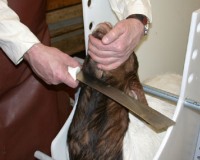MEDIA BRIEFING: Religious Slaughter
by - 24th October 2016
 Definition
Definition
RELIGIOUS slaughter is the process of livestock being slaughtered for meat, by slitting the animal’s throat and draining the blood. Religious slaughter is traditionally practised in Judaism (shechita) and Islam (dhabihah). Unlike modern slaughter methods, in both shechita and dhabihah, the animal is not stunned prior to being killed.
Law
Religious slaughter is lawful in the UK, however some European nations including Denmark, Sweden and Poland have banned it. John Blackwell, head of the British Veterinary Association this week said all animals should be stunned before slaughter in order to prevent suffering.
Kashrut & Dhabihah
Kashrut is the body of Jewish law dealing with which foods can be eaten and how those foods must be prepared. Kashrut comes from the Hebrew meaning ‘fit’, ‘proper’ or ‘correct’. ‘Kosher’ describes foods that meet the standard of Kashrut.
Halal is the Islamic equivalent of Kashrut. There are similarities between Judaism and Islam’s versions of religious slaughter (both religions do not stun the animal), but Muslims are divided as to whether or not Jewish slaughter suffices as a replacement for dhabihah.
Meaning
The Torah which is 3,000 years old, forbids consumption of blood because, ‘the life of the animal is in the blood’ according to the book of Leviticus 7:26-27. Blood was the main component in pagan sacrifice to appease idols. To stop this, Leviticus 17:7 explains that ALL meat for consumption should be brought for religious slaughter first. The priests aimed to stamp out idolatry this way.
The debate
The Bible proscription was to help maintain an identity distinct from the surrounding peoples,and to put an end to the horrors of pre-Judaic religion which included human sacrifice. Rules were ‘binding on them and their descendants for all time.’ Acts 10 in the New Testament that says that ‘nothing that God has made is unclean’ is irrelevant to this debate, which concerns not dietary laws but sacrifice. Christians believe that no further sacrifice of any kind was needed after the sacrifice of Jesus Christ.
The debate on animal welfare seems to overlook the fact that stunning does not kill the animal, and therefore does not affect the religious requirements of draining the blood while the animal is alive.
The laws regarding kosher slaughter are so sanitary that many kosher butchers and slaughter houses have been exempt from some Department of Agriculture regulations in the United States.
In the Islamic tradition, blood is considered harmful to consume per se. Allah’s name is pronounced over the meat as thanks during the slaughter process. In Jewish tradition God’s name is not pronounced during shechita. Because of this some Jews prefer not to use the term ‘religious’ to describe shechita.
The Halal Food Authority has led the way in educating Muslim scholars that ‘halal’ is a lifestyle choice, not just a food prescript. They launched a non-stun certification scheme this summer. The requirement that the animal is alive when slaughtered is not overturned by stunning, they say.
© Lapido Media 2016. Registered Charity No 1121301. www.lapidomedia.com
A media service provided without charge. For updated contacts lists go to info@lapidomedia.com
